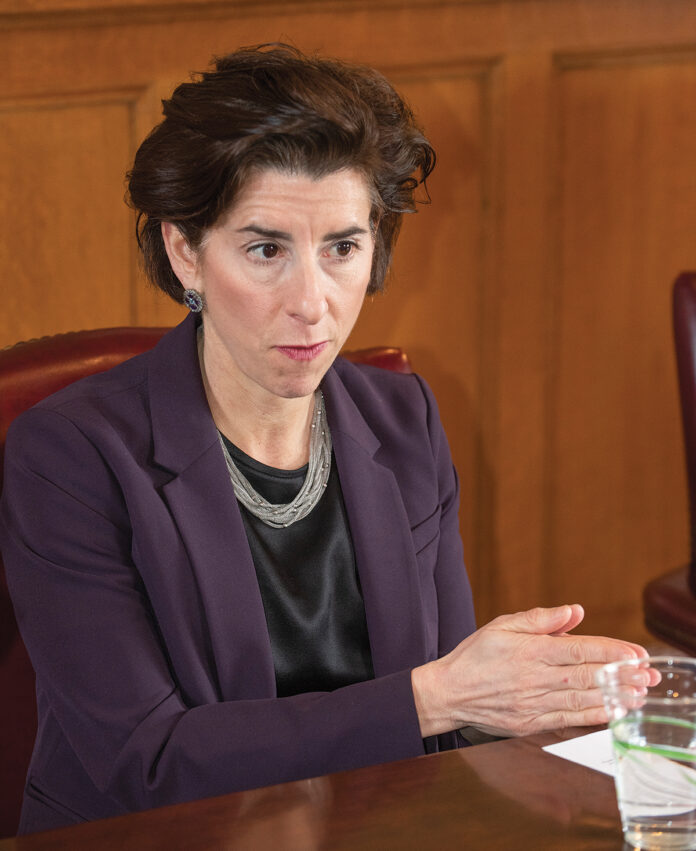PROVIDENCE – Gov. Gina M. Raimondo on Thursday released a $10.2 billion budget proposal that would bolster affordable and workforce housing creation through a new fee on real estate transactions, invest more state funds in industrial development and create state-run, adult recreational marijuana stores.
The proposal for fiscal 2021, which would take effect in July, includes $4.2 billion in general fund expenditures. That represents a $161.5 million, or 3.9%, increase from the revised budget for fiscal 2020.
The budget, which has been delivered to the General Assembly, represents the administration’s priorities for strengthening existing programs in government, as well as creating new investments in education, job training, the environment, health care and housing, according to state officials, who briefed reporters prior to its release.
It includes several new fees or sources of revenue for the state, and increased specialty taxes, intended to help drive funding to new programs and address an estimated $200 million budget deficit.
In her budget statement, Raimondo said the fiscal 2021 plan focuses on two economic drivers: housing and education. “The fact is too many working families struggle to find secure housing,” she wrote. “This year, I am proposing a housing bond and a permanent, dedicated funding stream for affordable housing. Nearly every other state already has this, and we need a tested, long-term solution.”
Raimondo has proposed a new “housing production” fee, which would create a two-tiered tax rate for the state’s real estate conveyance tax. All properties sold at $500,000 and under would retain the existing .45% rate, while properties sold at prices above that would pay .92% for the portion exceeding $500,000. The new rate would apply to commercial, as well as residential sales and is expected to generate $7.9 million annually once it is in place for a full year. The figure of $500,000 was chosen, according to the administration, because it roughly represents twice the median value of a Rhode Island home.
The proposal would create a dedicated stream of funds for workforce and affordable housing construction, which would be administered by the R.I. Housing and Mortgage Finance Corp. with input from a new housing resources coordinating committee.
As part of the program, the state would create incentives for local communities to increase their workforce and affordable housing, according to Commerce Secretary Stefan Pryor, to include a reimbursement for verified increases in education expenses that are related to new homes with school-age children.
Another proposal in the budget would reintroduce adult recreational marijuana sales, but have the state directly involved in the process. Last year, Raimondo had proposed legalized marijuana sales, and the prospect of it being reintroduced has already drawn criticism from legislative leaders.
The new proposal has already been included in her budget figures and is expected to raise about $21.8 million for the state.
Instead of privately run stores, such as the current medical marijuana facilities, the governor is now proposing a series of state-run dispensaries, similar to the state-run liquor stores found in New Hampshire. The budget proposal doesn’t state how many would be created.
Brett Smiley, acting director of the R.I. Department of Administration, said the proposal reflects that marijuana has been legalized in Massachusetts, and is a reality for law enforcement and communities in Rhode Island already.
“Without regard to how you might feel about the issue, we know there are legal marijuana shops just across the border in Massachusetts,” he said. “And there is going to be another proposal in Connecticut. This is something we are going to have to reconcile with. It’s the governor’s belief, the administration’s belief, that we should control our destiny and set the regulations the way we want them. And start generating the revenue we need to help support law enforcement and public health professionals, who are already dealing with some of the issues. But none of the revenue.”
For employers, worried about enforcing workplace requirements to be drug-free, the proposal would allow them to set their rules, he said.
In a response distributed to reporters, House Speaker Nicholas A. Mattiello criticized her decision to include revenue from marijuana sales. “I am very concerned about her proposal to generate revenue from the sale of recreational marijuana when she was advised this would not be an acceptable policy to the General Assembly. Over $20 million has been estimated, which is risky and short-sighted at best.”
He described the budget overall as “lacking many details” and said he was disappointed to see it includes tax and fee increases that have previously been rejected by the General Assembly.
According to the budget proposal:
- The spending plan fully funds the state’s education formula for K-12, but does not send any more funds directly to Providence, where the R.I. Department of Education last year assumed control of the public schools.
- It includes additional funds for children learning English as a second language, and would expand the state Wavemaker Fellowship, which provides student loan repayment relief, to teachers who instruct in the STEM subjects.
- Raimondo recommends Rhode Island increase the minimum age to purchase cigarettes and tobacco products from 18 to 21, and increase the cigarette excise tax by 35 cents a pack to $4.60.
- She has proposed a reinstatement of the state’s sales tax on wine and spirits, while lowering alcohol excise taxes. In 2014, the state stopped collections on wine and spirits, in an effort to promote sales of the products, but it did not have the desired effect, Smiley said. Reinstating the sales tax, while lowering the excise tax, is expected to generate $9 million in revenue.
- Raimondo has reintroduced a proposal to expand the existing state sales tax to a variety of services, including software for computer system design, courier services, lobbying, hunting, trapping and shooting ranges and interior design services.
- The governor wants to invest another $14 million in Real Jobs RI, a workforce- development program, to expand its reach. An apprenticeship program within the state’s Department of Corrections will be created with the goal of improving post-release employment for inmates. It would receive $250,000 of the Real Jobs funds.
- Three ballot initiatives are proposed as part of the budget package, to include $268.8 million in new funds. Of that amount, $117 million would be directed to higher education projects.
- Another ballot initiative would recommend $25 million for affordable housing construction, as well as several infrastructure improvements. These would include $20 million for Quonset Pier, to construct a new pier at Terminal 5, rehabilitate Pier 1 and continue dredging.
- Another $21.5 million in a bond initiative would be directed to industrial site development. The funds would be used to prepare sites, across the state, for facilities that support manufacturing, assembly, distribution and other commercial activities.
- Raimondo has proposed an expansion of the RIte Share premium assistance program, which will require for-profit employers with at least 50 employees to report their employer-sponsored insurance information to the state’s Division of Taxation. Employers that do not do this would be fined for noncompliance. According to the administration, RIte Share is a mandatory program for employees who qualify for Medicaid but have access to an employer-sponsored insurance plan. The proposal is intended to enforce this participation requirement, which is now at 4,000 statewide, far lower than what state officials estimate is the true figure.
Mary MacDonald is a staff writer for the PBN. Contact her at macdonald@pbn.com.












